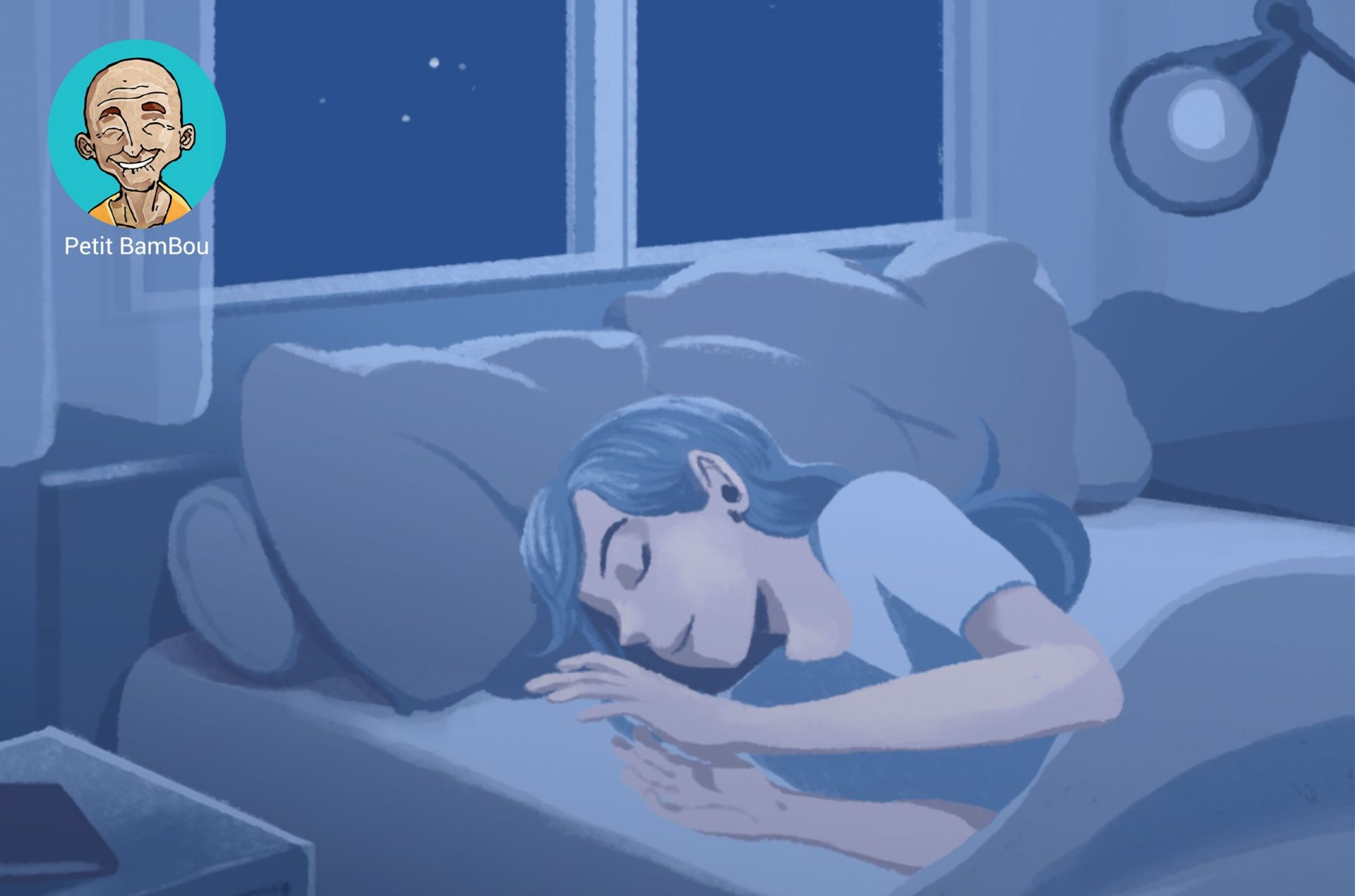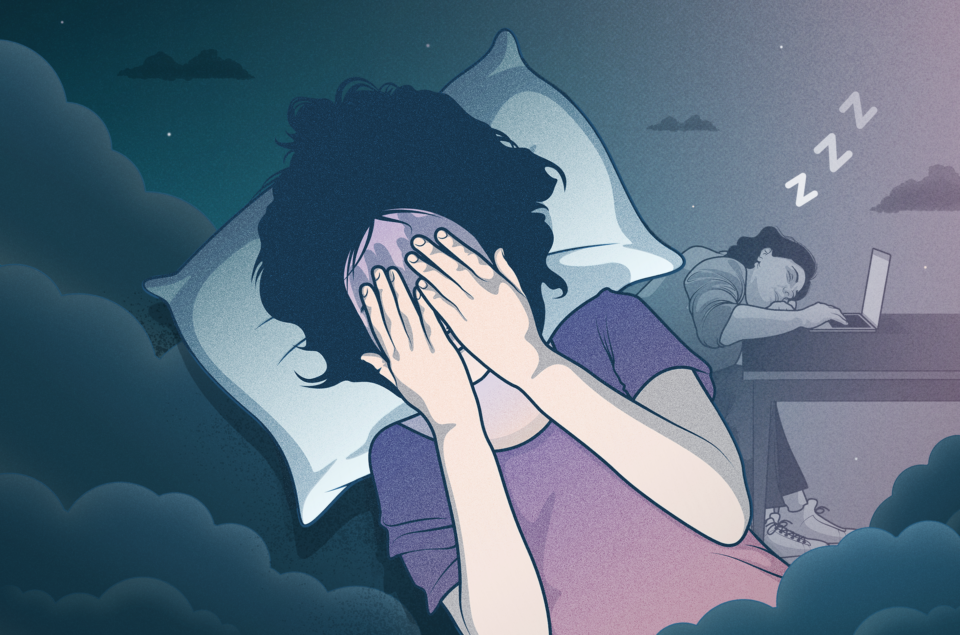How sleep meditation can help you get a better night’s sleep
It’s estimated that anywhere from 10% to 60% of adults suffer from chronic insomnia. While many factors impair our ability to sleep, stress is one of the main culprits that inhibits sleep and prevents us from getting the quality and duration our body needs to repair and rejuvenate. With all these external stressors, it may be worth considering sleep meditation to relax your way into a restful night. Mindfulness and meditation practice helps to create a positive habit and can help you feel more peaceful, serene and calm. And it’s not just in our heads. Physiological changes also occur during meditation.
In this article, we’ll cover:
- Does meditation help with sleep?
- The benefits of sleep meditation
- Guided Meditation for a better night’s sleep
Does meditation help with sleep?
Although it’s not the equivalent of flipping a switch to better sleep, the practice of sleep meditation over time can be a powerful tool on the path to wellness and sleep health. More and more research is aimed at studying how mindfulness principles can be used to treat insomnia and how meditation can improve the relaxation response when faced with stress and worry.
According to research, meditation helps with sleep by reducing pain sensitivity, changing our perception of discomfort, and improving control of the autonomic nervous system, which also reduces how easily you wake up in the middle of the night. In general, this means that mindfulness meditation before bed may even improve sleep quality in those who don’t even experience sleep problems!
The benefits of sleep meditation
Sleep meditation is a specific technique that provides a natural sleep aid for those who struggle with letting go of the day and are unable to rest the mind and body when they need to. Here are some of the benefits of working sleep mindfulness meditation into your bedtime routine:
- Lowers stress and anxiety. Particularly in this enormously stressful time in the world, we need to pay special attention to our stress and anxiety levels. Meditation helps us let go of stress by calming the mind and promoting a sense of inner peace. When we meditate we lower the levels of cortisol, the stress hormone. This, in the long term, can reduce stress-related inflammation and improve insulin resistance.
- Evokes a relaxation response in the body. Through techniques that focus on breathing and bringing the mind’s attention to the present moment, meditation evokes the relaxation response which is conducive to sleep. It induces physiological responses like lowered heart rate, controlled breathing and enhanced melatonin and serotonin levels, studies show.
- Balances the nervous system. The autonomic nervous system is made up of two parts: one keeps us alert, the other helps with sleep. The sympathetic nervous system is akin to a gas pedal that regulates functions like arousal and inflammation. The parasympathetic system is the brake that controls the anti-inflammatory and relaxation response. We need both, but they’re often out of balance because of chronic stress. Meditation has been shown to help overcome the imbalance of sympathetic nervous system dominance.
- May help with depression and other ailments. A pivotal study from 2015 found that mindful awareness practices (or meditation) resulted in improvements in sleep quality, and possibly served to remediate sleep problems such as insomnia, depression, fatigue and fatigue severity. In this oft-cited study one control group engaged in 10 to 30 minutes of mindful meditation a day while the other participated in a sleep education class over the same time period. The meditation group experienced fewer insomnia symptoms and less daytime fatigue. In addition, other studies have proved that the state of awareness provided by meditation helps reduce distress and improve emotion regulation.
- Helps reset your circadian rhythm. Meditation for sleep may also be useful to adjust your sleep schedule after suffering from jet lag or if you work in shifts.
- Causes lasting changes in the brain that may impact sleep. Studies made on people that have practiced meditation for a while have demonstrated that meditation improves deep sleep and REM sleep, causing fewer nighttime awakenings.
- It’s safe. Unlike pharmacological treatments for insomnia and sleep disorders which are often short-term and may carry potential side effects, meditation is completely safe, free and accessible to everyone. Dare we say, it’s even fun!
How often should you practice meditation for sleep?
The daily practice of mindfulness meditation is recognized throughout the world as a path to better self-knowledge and well-being. Practicing sleep meditation consistently helps us bring clarity of mind, develop our capacity for compassion and empathy, create meaningful connections to others, focus on gratitude in our lives, explore and work through our fears, and develop the all-important mind-body connection. When incorporated into a bedtime routine, it can prepare the mind and body for a better night’s sleep. You just need to find that sleep meditation technique that better works for you.
Guided meditation for a better night’s sleep
With our commitment to promoting health and wellness, Sleep Cycle has partnered with Petit BamBou, one of the world’s most downloaded meditation apps working with 50+ experts in mindfulness, cognitive behavior therapy, sleep, non-violent communication and positive psychology to bring our users guided sleep meditation content they can use as a sleep aid.
Simple steps can make a huge difference:
- Prepare yourself and your bedroom: dim the lights, wear comfortable sleepwear, keep the space as quiet as possible.
- Select one of the meditation soundscapes you will find in our app. It is recommended to do this hours before bedtime, so you avoid using your phone too much in the previous moment of meditation. Click on “play” and lie down in your bed and start breathing slowly and deeply.
- Focus on the story. If your mind starts wandering, no judgement: simply put your attention back to the voice.
Whether you’re a beginner or a lifelong practitioner, using Petit BamBou’s guided sleep meditation program can help you fall asleep more easily, sleep better, improve your sleep quality and wake up more rested and restored. Get started with a free sleep meditation trial in the Sleep Cycle app today.










